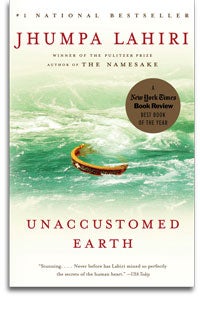UnCommon Reading
This year, for the first time, URI selected a “Common Reading” book for the incoming freshman class. Generating quite a buzz was uricommonreading.blogspot.com, which Provost Donald DeHayes created to record student, faculty, and staff responses to the Pulitzer Prize-winning story collection by Jhumpa Lahiri, Hon. ’01.

In comments posted on the blog, readers offer interpretations and defend their favorites. The author herself posted a welcome message explaining her connection to URI: “Although my stories are not autobiographical, two of the stories in Interpreter of Maladies are informed by memories of my upbringing in Kingston in the 1970’s. The narrator in ‘The Third and Final Continent’ is based, in part, on my father, who has been an employee of URI now for 39 years, and that story was my attempt to commemorate, in fiction, his journey to the United States. In general, many of the characters in my books tend to be either students or professors. When people ask me why, I tell them URI is the reason.”

As one of the speakers featured at URI’s fall 2009 Honors Colloquium, uri.edu/hc, Jhumpa Lahiri will read on November 10 from her latest book of stories, Unaccustomed Earth.
In a September phone interview, the author spoke at length about growing up near URI.
Lahiri writes eloquently of displacement and culture shock in her books, including The Namesake (a 2006 film) and Unaccustomed Earth. “I was always aware that [my] family didn’t fully belong in the place where we lived,” she says in the welcome message. “But I never doubted that we were a part of URI. The University was a sanctuary of tolerance and respect, a creative and dynamic place, filled with people of diverse backgrounds who embraced intellectual inquiry and celebrated the life of the mind. URI was my playground, the park I roamed in on Sunday afternoons. When we had guests from out of town, my parents proudly showed off the campus, pointing to its lovely buildings and tranquil, open space. I attended nursery school at the Child Development Center on Lower College Road and enjoyed my first ‘meals out’ at the cafeteria in the Memorial Union. I learned to swim in the University pools, went to movies at Edwards Hall, and learned to drive a car in the parking lot of the Fine Arts Center. For many years, I helped my mother sell Indian snacks at the International Food Festival, where rows of tables, arranged on three sides of the ballroom in the Union, were covered with delicacies from all over the world.”
Fittingly, bloggers who mention specific images from Interpreter of Maladies most often focus on food:
 Ethan Naylor ’13 on “Mrs. Sen’s”: I was first intrigued by the little things: the beach, the frozen lemonade—everybody’s favorite Del’s lemonade?—and other tidbits … After this I got so much more out of the little things that Mrs. Sen did in the market, trying to find a whole fish that reminded her of home [India], versus the place where this story takes place, Rhode Island, which is MY home. I think that I sympathized most with Mrs. Sen …. In the culture she now found herself in, she was more childish than the 11-year-old boy Eliot.
Ethan Naylor ’13 on “Mrs. Sen’s”: I was first intrigued by the little things: the beach, the frozen lemonade—everybody’s favorite Del’s lemonade?—and other tidbits … After this I got so much more out of the little things that Mrs. Sen did in the market, trying to find a whole fish that reminded her of home [India], versus the place where this story takes place, Rhode Island, which is MY home. I think that I sympathized most with Mrs. Sen …. In the culture she now found herself in, she was more childish than the 11-year-old boy Eliot.
 Professor of Marketing Nik Dholakia on “Sexy”: For me the operative metaphor was “Hot Mix.” This is the stash of crunchy Indian snack that Miranda’s Indian coworker keeps in her office, and furtively reaches into during the workday. …In my office drawer at URI, there’s a little plastic container of “Chaat Masala.” This is the Indian blended spice that is sprinkled on a lot of oh-so-tasty-but-not-so-good-for-you Indian snacks. I bring this stuff out to sprinkle when my office lunch is lacking that spice kick. …These instances of exotic spice are often essential to understanding a culture such as that of India. …The goal of the URI 2009 colloquium “Demystifying India” is similar to what Jhumpa Lahiri does in her writing—to bring many aspects of India in stark confrontation with the global setting.
Professor of Marketing Nik Dholakia on “Sexy”: For me the operative metaphor was “Hot Mix.” This is the stash of crunchy Indian snack that Miranda’s Indian coworker keeps in her office, and furtively reaches into during the workday. …In my office drawer at URI, there’s a little plastic container of “Chaat Masala.” This is the Indian blended spice that is sprinkled on a lot of oh-so-tasty-but-not-so-good-for-you Indian snacks. I bring this stuff out to sprinkle when my office lunch is lacking that spice kick. …These instances of exotic spice are often essential to understanding a culture such as that of India. …The goal of the URI 2009 colloquium “Demystifying India” is similar to what Jhumpa Lahiri does in her writing—to bring many aspects of India in stark confrontation with the global setting.
Emma Bailey ’13 on “Interpreter of Maladies”: The symbolism in this story was astounding. Mrs. Das, before confiding in Mr. Kapasi, offered the tour guide some of her puffed rice. She hadn’t offered any of it to anyone else in her family… The trail of puffed rice that she accidentally left behind was the guilt and sadness that she hadn’t expressed to anyone for eight years. The monkeys eating away at it depicted the stress itself, just as it had eaten away at her for so long.
 Rebecca Renna ’13 on “When Mr. Pirzada Came to Dine”: When Mr. Pirzada hears that India will have to go to war against Pakistan, he accidently ruins the jack-o-lantern. “What resulted was a disproportionately large hole the size of a lemon, so that our jack-o-lantern wore an expression of placid astonishment…” I found this brilliant—have the pumpkin’s facade match that of Mr. Pirzada.
Rebecca Renna ’13 on “When Mr. Pirzada Came to Dine”: When Mr. Pirzada hears that India will have to go to war against Pakistan, he accidently ruins the jack-o-lantern. “What resulted was a disproportionately large hole the size of a lemon, so that our jack-o-lantern wore an expression of placid astonishment…” I found this brilliant—have the pumpkin’s facade match that of Mr. Pirzada.
The stories proved provocative as bloggers persuaded one another to take second looks, gained insight into their own lives, and surprised themselves with the intensity of their reading experiences:
Kaitlyn Luke ’13: Receiving this book at orientation, I was not excited to jump into it … But, going to college made me think, maybe I should change my ways because I know my mom isn’t going to pop in my dorm room and push me to no longer procrastinate. So I went outside on my deck, opened up Interpreter of Maladies and just read. I read and ultimately couldn’t put it down. I had a dentist appointment to go to and brought it with me. I brought it to work with me to read it on breaks. I even passed to go out with my friends just because I was so involved with the different characters in each story that I just wanted to keep learning about their lives, and relating to their situations.
Hannah Gardner ’13: [URI Providence Dean] John McCray’s points led me to a greater appreciation for [“A Real Durwan”]. Boori Ma’s story can directly relate to the culture of the United States. There is a specific caste system in America based on the amount of money an individual makes; the higher the salary, the more respected someone is…. Another similarity is the simple fact that crime is typically blamed on people of the lower class.
Kristie Saliba ’13: I’m disappointed to read that everyone else didn’t enjoy “A Real Durwan” because it was one of my favorites. … I like this story so much because I believe that everyone should just be themselves, and shouldn’t lie about where they came from. This ties into our experience of entering college because we just need to be who we really are.
By Gigi Edwards
Photos by Elena Seibert; Nora Lewis; © iphotoimages.com
 Home
Home Browse
Browse Close
Close Events
Events Maps
Maps Email
Email Brightspace
Brightspace eCampus
eCampus


